Donald Trump’s former campaign chairman was working with a former Russian spy during the US presidential race over debts he owed to a Kremlin-linked oligarch, it has been claimed.
Paul Manafort led Mr Trump’s campaign for president for three months in 2016 before he was forced to resign after his links to Russian interests in Ukraine were made public.
Now a former member of the GRU, Russia’s most feared and secretive spy service, has said he was in contact with Manafort during that time over millions of dollars the political adviser allegedly owed to billionaire businessman Oleg Deripaska.
“He owed us a lot of money, and he was offering ways to pay if back,” Victor Boyarkin toldTime, in reference to Manafort in 2016.
Mr Boyarkin also told the magazine he had been approached by special counsel Robert Mueller’s office, which is probing possible collusion between Russia and the Trump campaign, but that he told investigators “to go dig a ditch”.
His claims could be relevant to Mr Mueller’s investigation as they would present some of the clearest evidence of leverage powerful Russians had over a senior member of Mr Trump’s team.
Mr Boyarkin was last month placed at the top of the US government’s latest sanctions list against high-profile Russians involved in Moscow’s “continued regard for international norms”.
The Treasury Department document described Mr Boyarkin as a former GRU officer who “reports directly to Deripaska and has led business negotiations on Deripaska’s behalf”.
In a 2015 complaint filed to a court in Virginia, Mr Deripaska, a metals magnate, alleged Manafort owed him $19m (£14.95m) in relation to a failed business investment in Ukraine.
Former Trump campaign chairman Paul Manafort pleads guilty
Lawyers for Mr Deripaska complained in a petition filed in the Cayman Islands a year earlier that Manafort had “simply disappeared”.
Mr Boyarkin said it was left to him to reclaim the money on Mr Deripaska’s behalf. “I came down on him hard,” he said.
When Manafort reappeared, serving initially in April 2016 as an unpaid adviser to the Trump campaign, the 69-year-old tried to offer Mr Deripaska “private briefings” about the election, apparently in an attempt to “get whole”, according to emails seen last year byThe Atlantic.
He attempted to do this through an old associate, Konstantin Kilimnik, who had worked for Manafort for a decade in Ukraine.
There is no evidence any meetings occurred between Manafort and Mr Deripaska, and it is unknown if Manafort is actually indebted to the oligarch, or if he paid him back.
Mr Boyarkin’s assertion he was in contact with Manafort, in his role as debt collector for Mr Deripaska, would appear to contradict the latter’s denials last year of any contact with Manafort during the presidential election.
Mr Deripaska, one of Russia’s wealthiest men, remains under US sanctions imposed in April in retaliation for alleged Russian meddling in the 2016 presidential election.
He amassed his fortune under Mr Putin and has bought assets abroad in ways widely perceived to benefit the Kremlin’s interests.
US diplomatic cables from 2006 described him as “among the two or three oligarchs Putin turns to on a regular basis” and “a more-or-less permanent fixture on Putin’s trips abroad”.
The 50-year-old achieved a deal of fame in the UK in 2008 when the then-business secretary, Lord Mandelson, and shadow chancellor George Osborne found themselves aboard his yacht off the coast of Corfu last summer.
Mr Deripaska has been contacted for comment.
Manafort was convicted of eight financial crimes in August, uncovered by Mr Mueller’s team, and faces sentencing early next year.
Manafort could not be reached for comment. Special counsel spokesperson Peter Carr declined to comment.
Reuters
Graham more upbeat on Syria troop withdrawal after Trump meeting
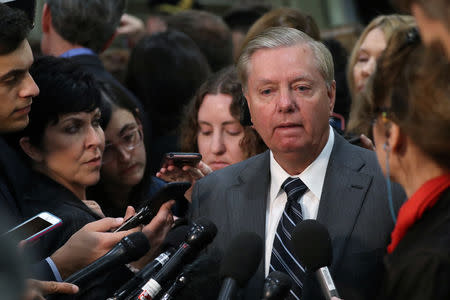
By Jonathan Landay
WASHINGTON (Reuters) - A senior Republican U.S. senator said he emerged from a White House meeting with President Donald Trump on Sunday reassured that Trump is committed to defeating Islamic State even as he plans to withdraw American troops from Syria.
Senator Lindsey Graham had warned that removing all 2,000 U.S. troops from Syria would hurt national security by allowing Islamic State to rebuild, betraying U.S.-backed Kurdish fighters of the YPG militia battling remnants of the militant group, and enhancing Iran's ability to threaten Israel.
During a morning television interview, Graham said he would ask Trump to slow down the troop withdrawal, which was announced earlier this month and drew widespread criticism.
An ally of Trump, although he has opposed some of his foreign policy decisions, Graham was more upbeat after the meeting.
"We talked about Syria. He told me some things I didn't know that made me feel a lot better about where we're headed in Syria," Graham, an influential voice on national security
policy who sits on the Senate Armed Services Committee, told reporters at the White House.
"We still have some differences but I will tell you that the president is thinking long and hard about Syria - how to withdraw our forces but at the same time achieve our national security interests," Graham said.
Asked if Trump had agreed to any slowing down of the troop withdrawal, Graham said: "I think the president's very committed to making sure that when we leave Syria, that ISIS is completely defeated."
He said Trump's trip to Iraq last week was an eye-opener and he understood the need to "finish the job" with Islamic State, also known as ISIS.
"I think the president has come up with a plan with his generals that makes sense to me," Graham said.
Graham said later on Twitter that Trump would make sure that any withdrawal from Syria "will be done in a fashion to ensure: 1)ISIS is permanently destroyed 2)Iran doesn't fill in the back end. And 3)our Kurdish allies are protected."
The Pentagon says it is considering plans for a "deliberate and controlled withdrawal." One option, according to a person familiar with the discussions, is for a 120-day pullout period.
KURDISH FORCES
Graham told reporters that Trump was committed to making sure Turkey did not clash with the Kurdish YPG forces once U.S. troops leave Syria, and was assuring the NATO ally that it would have a buffer zone in the region to help protect its own interests.
Turkey views the YPG as a branch of its own Kurdish separatist movement and is threatening to launch an offensive against the group, igniting fears of significant civilian casualties.
U.S. commanders planning the U.S. withdrawal are recommending that YPG fighters battling Islamic State be allowed to keep U.S.-supplied weapons, according to U.S. officials.
That proposal would likely anger Turkey, where Trump's national security adviser, John Bolton, holds talks this week.
Trump decided on the Syria withdrawal in a phone call with Turkish President Tayyip Erdogan, ignoring the advice of top national security aides and without consulting lawmakers or U.S. allies participating in anti-Islamic State operations. The decision prompted Defense Secretary Jim Mattis to resign.
(Reporting by Jonathan Landay; Additional reporting by Doina Chiacu and David Lawder; Editing by Phil Berlowitz and Peter Cooney)
Reuters
Iraq hints at bigger role in Syria after U.S. withdrawal

BAGHDAD (Reuters) - Iraq's prime minister said on Sunday that top security officials from Baghdad had met Syrian President Bashar al-Assad in Damascus, and hinted at a bigger Iraqi role fighting Islamic State militants as U.S. troops withdraw from Syria.
"This issue has a lot of complications," Adel Abdul Mahdi told reporters, referring to U.S. President Donald Trump's surprise announcement this month that he will withdraw U.S. forces from Iraq's neighbor.
"If any negative development takes place in Syria it will affect us. We have a 600 km (400 mile) border with Syria and Daesh (Islamic State) is there," Abdul Mahdi said.
The premier said the Iraqi delegation had visited Damascus to "gain the initiative, not just deal with the consequences" of any future Islamic State (IS) activity emboldened by the U.S. withdrawal. Iraqi news websites said the visit took place on Saturday.
Abdul Mahdi said Iraq sought to move beyond its current arrangement with Syria - under which it launches air strikes against Islamic State militants in Syrian territory - but did not got into more details.
"There are groups operating in Syria, and Iraq is the best way to deal with this," he said, responding to a question about the possibility of increased involvement of Iraqi forces in Syria.
Iraqi Shi'ite Muslim paramilitary groups backed by Iran already operate inside Syrian territory against the Sunni Muslim militants of Islamic State.
Abdul Mahdi has previously said that about 2,000 Islamic State fighters are operating near the border in Syria and trying to cross into Iraq.
Islamic State was militarily defeated in Iraq in 2017, but has continued to launch guerilla-style attacks on security forces in the north of the country.
(This story corrects name to Mahdi in paragraph two)
(Reporting by Ahmed Rasheed; Writing by John Davison; Editing by Andrew Heavens)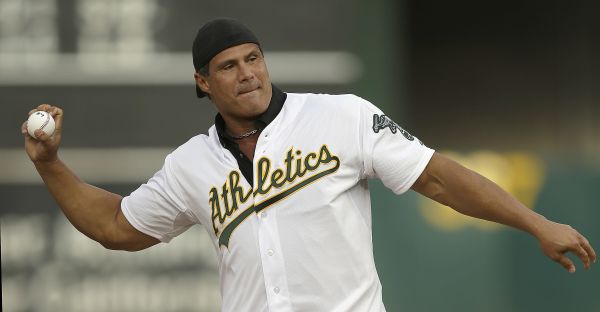
Jose Canseco uses baseball milestone to justify presidential bid and it might actually make sense
1038 reactions
5% 79% 16%




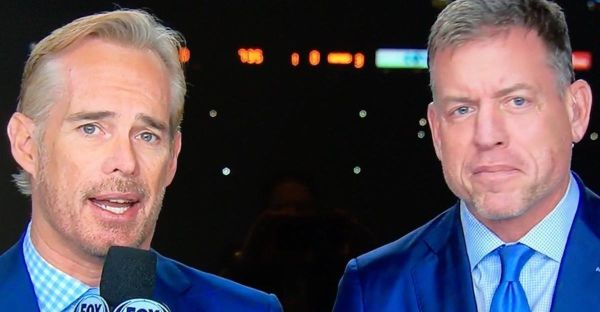
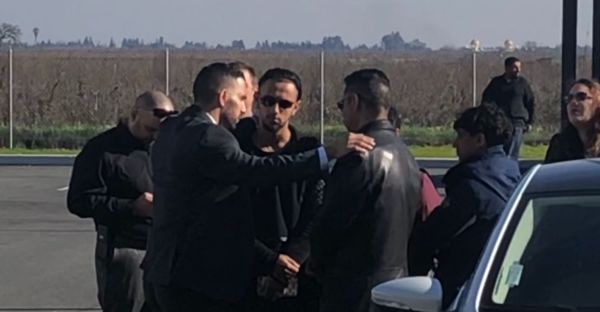
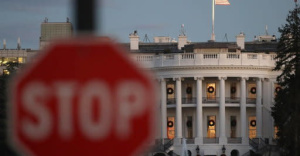

No comments:
Post a Comment